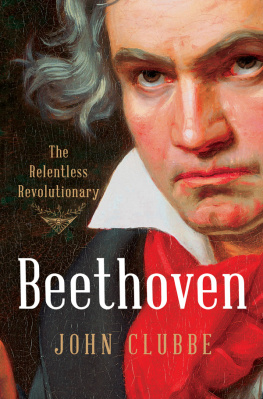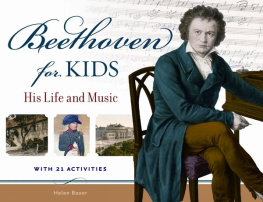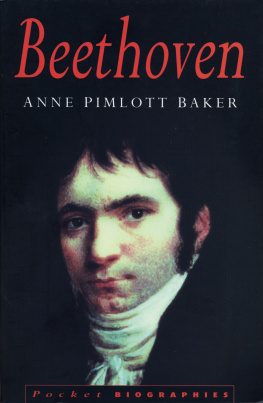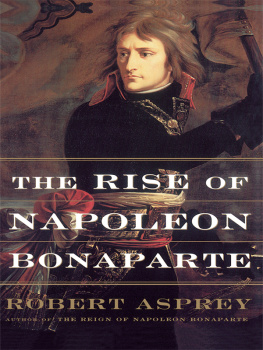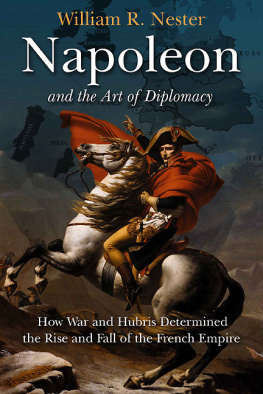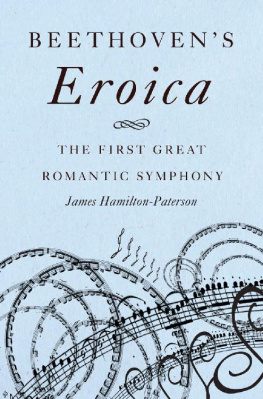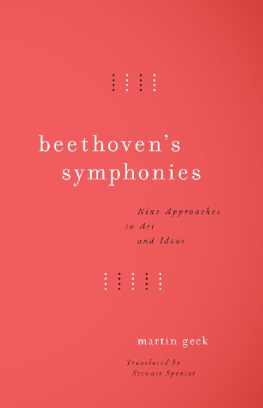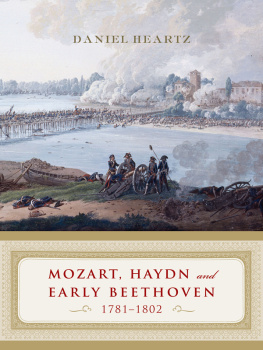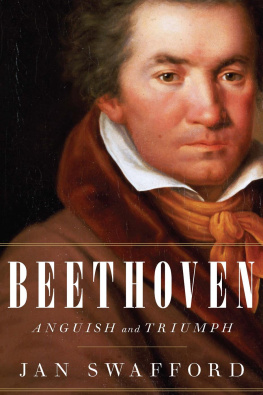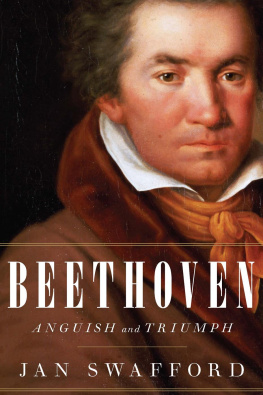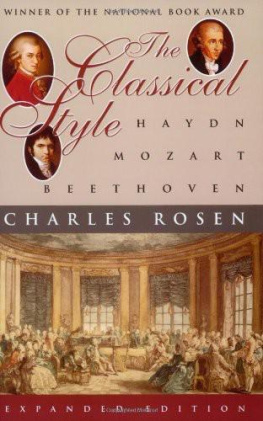Contents
Guide

ALSO BY JOHN CLUBBE
BOOKS
Victorian Forerunner: The Later Career of Thomas Hood
English Romanticism: The Grounds of Belief (with Ernest J. Lovell, Jr.)
Byron et la Suisse: deux tudes (with Ernest Giddey)
Cincinnati Observed: Architecture and History
Byron, Sully, and the Power of Portraiture
EDITED VOLUMES
Selected Poems of Thomas Hood
Two Reminiscences of Thomas Carlyle
Carlyle and His Contemporaries
Froudes Life of Carlyle
COEDITED WORKS
The Collected Letters of Thomas and Jane Welsh Carlyle , volumes 19
Victorian Perspectives (with Jerome Meckier)
Beethoven

THE RELENTLESS REVOLUTIONARY
JOHN CLUBBE

Copyright 2019 by John Clubbe
All rights reserved
First Edition
For information about permission to reproduce selections from this book, write to Permissions, W. W. Norton & Company, Inc., 500 Fifth Avenue, New York, NY 10110
For information about special discounts for bulk purchases, please contact W. W. Norton Special Sales at specialsales@wwnorton.com or 800-233-4830
Book design by Chris Welch Design
Production manager: Julia Druskin
Library of Congress Cataloging-in-Publication Data
Names: Clubbe, John, author.
Title: Beethoven : the relentless revolutionary / John Clubbe.
Description: First edition. | New York : W. W. Norton & Company, [2019] | Includes bibliographical references and index.
Identifiers: LCCN 2018061106 | ISBN 9780393242553 (hardcover)
Subjects: LCSH: Beethoven, Ludwig van, 17701827Criticism and interpretation. | MusicPolitical aspectsHistory18th century. | MusicPolitical aspectsHistory19th century.
Classification: LCC ML410.B42 C55 2019 | DDC 780.92dc23
LC record available at https://lccn.loc.gov/2018061106
ISBN 9780393242560 (ebook)
W. W. Norton & Company, Inc., 500 Fifth Avenue, New York, N.Y. 10110
www.wwnorton.com
W. W. Norton & Company Ltd., 15 Carlisle Street, London W1D 3BS
For Joan
CONTENTS
To us Beethoven is the Revolution.
HUGH OTTAWAY
Beethoven revolutionized the world of musictaking what music was in his time, and revealing what it could become. He was also, importantly, a political revolutionaryin his unique way, a true heir of the French Revolution. This study presents Beethoven within the context of the revolutionary era that followed, through which he lived and during which he composed his astonishing and overwhelming music. It also places Beethoven alongside contemporary literary and artistic figures. It offers a new approach to the composers heroic striving, his equally heroic despair, and his messianic mission to improve through music the world both of his own time and of times to come.
Beethovens music thus reflects both the turmoil of the age in which he lived and no less the turmoil within himself. As he matured, he affirmed ever more passionately the ideals in which he believed. By focusing on the revolutionary origins of his music, itself a response to the revolutionary age in which he lived, we enter into the heart of his genius. For listeners, past and present, who have yearned for political and social change, Beethovens music has been and remains an inspiration. Placing Beethoven in the foreground of his era brings us closer, I believe, to a true evaluation of the man and his creativity. Though roughly chronological, my chapters can be regarded as a series of studies taking up interrelated ideas and themes. This method, as much an interpretation of Beethoven as biography, allows me to explore aspects of Beethovens genius hitherto neglected.
We may never fully fathom the mystery of Beethovens phenomenal range of creativity, but attempts at understanding it happily continue. Nor can we fully determine the role of the French Revolution in shaping him politically and creatively. Beyond doubt it exerted far greater stimuli than has been recognized. Through his compositions of the 1790s Beethoven took part, admittedly from afar, in the ongoing revolution that had begun in France in 1789 and whose ideals soon crossed European borders. The Revolution exerted a lifelong influence upon Beethovens thinkingand his creativity. It offered no less than a new path for humankind to follow. In 1792 Beethoven moved from Bonn to Vienna, the music capital of the largest absolutist and repressive state within Europe. Usually but not always he had to remain verbally silent on political issues. Yet through his revolutionary music he began to serve as a leader in the German-speaking world.
Is regarding Beethoven as a revolutionary such a radical claim? If we contemplate past composers within the context of the musical world of their day, was not Bach a revolutionary? Gluck? Haydn? Mozart? And, subsequent to Beethoven, werent Wagner, Mahler, Schoenberg, Ives, and Cage revolutionaries? Can we not also say the same of creative geniuses in fields other than music? Were not Jefferson, Wordsworth, Byron, Goya, Joyce, Czanne, Marie Curie, Mies van der Rohe, Einstein, along with others in their respective fields, also revolutionaries? Did they not change the way their contemporaries and those who came after them perceived the world? It seems necessary to explore Beethovens genius within the profound effect the French Revolution had on him, first in Bonn, then in Vienna.
Beethovens spectrum of compositions, from the early cantatas for Joseph II and Leopold II to the late Ninth Symphony, teems with revolutionary sentiment. Works of astounding dimensions in betweenthe Eroica Symphony, Fidelio , the Fourth and Fifth Piano Concertos, the music for Goethes drama Egmont incarnate his revolutionary approach. In the structure of their composition, in their sonorities, their rhythms, their treatment of the rules of harmony, in his conception of them as a body, Beethoven wanted his music to help bring about a world renewed. He composed his startling works fully aware he faced in Vienna a government vigorously hostile to revolutionary ideas. Still, by imposing upon Viennese music lovers his new appreciation of how to listen to music, he did not hesitate to challenge the status quo. The emerging political climate helped shape Beethovens vision of an ideal republic and its social relationships.
Western music reached a high point in the half century from 1779 to 1828. The period begins with the mature works of Mozart and Haydn and closes with the death of Beethoven in 1827 and of Schubert a year later. As well, Beethoven lived in a formative period of European history, one marked by huge societal and intellectual changes fueled by the Revolution. From the first the composer responded vigorously to the new currents stirring around him. Admittedly, the wealth of his ideas could create disturbing music. Lenin a century later would fear the power of this music. Over the past two hundred years Beethovens genius has elicited far more positive than negative political responses. To elucidate Beethovens life and creativity within the context of the times, I bring in a number of leading contemporaries, among them Goethe and Schiller, Hegel and Fichte, Chateaubriand and Byron, Goya and Kleist, as well as a host of others whose achievements shed light upon Beethovens. Asked why he put aside his work on other composers to focus exclusively on Beethoven, Romain Rolland, the French Nobel Prizewinning author and Beethoven biographer, replied that the more he thought about Beethoven, the more he remains unfathomable to me. That many still find the composer unfathomable gives evidence of a complex greatness.

